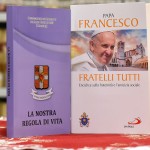The message of the encyclical is as unrealistic and far fetched as the Gospel. However, it is the only viable option by going back in order to find our way for the future.
Pope Francis has a way of throwing us off track. He did so with Evangelii Gaudium. He did it again a few years later with Laudato si! And on October 4, the feast of St. Francis, he continued along the same line with his Fratelli tutti! As the bishop of Rome, Pope Francis has accumulated a sizable repertoire of writings and documents with a style of writing that will surely mark the future writings of the Church. Gone are the lengthy complicated doctrinal encyclicals with its technical jargon. Pope Francis’ letters are not from on high trying to persuade by their authority; these writings have authority because they seek to convince by their arguments. And if the argument is not convincing, no one is held to account for not accepting it, except perhaps in the current letter on the issue of the death penalty and just war.
Why should Dehonians be interested in the latest letter? Fratelli tutti is the latest of papal writings that fall under the category of social encyclicals. Father Dehon witnessed being present at the launching of this social endeavour of the church in 1891. At the time, because of his close association with Leo XIII, he accepted the mandate to “preach” these encyclicals. The issues were close to his heart. Two years earlier, in 1889, he had begun something similar in his writings. He sought to promote the social mission of the Heart of Jesus by starting Le règne du Sacré-Coeur, a monthly periodical. He believed that in the context of the liberalism and laisser-faire economics of his time what was lacking in French society was what he himself had experienced within through the love of the Heart of Christ. In his writings, he asked what would happen if this love – which he called “pure love” – would become the internal driving force of the political and economic enterprises of his time.
In Fratelli tutti as well as in Pope Benedict’s social encyclical, Caritas in veritate, the central issue was the same. What happens if humans were to insert love – the biblical agape – in their social relations and encounters. What would happen to the internal economic, social and political relations in a nation or internationally, if we considered the earth as truly belonging to all equally, if we acted toward all earth’s inhabitants as our sisters and brothers, if the relations between humans were not determined by economic power and “right” but by love. Pope Benedict had already explored how we might pass beyond a notion of justice to include the notion of sibling in my relations with others. He had even dared to propose that society would benefit in their social relations if they took the word of Jesus to mind: “Love one another as I have loved you”, to allow us to consider gratuity and graciousness as a measuring stick of our social relations.
This is also the task that Pope Francis gave himself in the latest encyclical. He encourages all of humanity to explore – the encyclical is addressed to all not only to the Catholic community – what the Gospel imperative of love would mean for what Cardinal Czerny has called the “world on the brink”. Many might ask, “Is it not a bit late in the day when the coronavirus pandemic is ravaging the world’s population, when the world economy is imploding under the weight of inequality, and the world’s ecology is threatened by questions of habitablility, when politically humans are more and more divided and incapable of hearing one another.” It is indeed a daunting task. Pope Francis provided us with an image of this mission when in the midst of the pandemic he stood alone in St. Peter’s square praying for and blessing the world. Behind him is the massive architecture of St. Peter but empty of people. The institutional power seems broken, the imperial, post-Constantinian framework divested of its symbolic attraction. In a moment of a breakdown of human power relations, is it time go back to the drawing board? We all might wonder: Is it not too late?
Marcello Neri in his Giustizia della Misericordia (2016) concluded that with the papal ministry of Francis in 2013 a new era in the Church seems to have been inaugurated. He called it the end of the Church as a separated reality. It ended what he called “a Catholic occupation of public space.” This time, with the pandemic stalking us from all sides, it feels like the end of an era. Pope Francis is warning us: “Don’t even think of trying to go back to a time prior to COVID 19.” If one wishes to go back, he advises us, then go back to the Gospel, the joy of the Gospel and drop all the unnecessary what we accumulated. Let us use this time to rethink how we take care of one another economically, how we live together politically, how we relearn to welcome one another, how we learn to speak “charitably” with one another to create neighbours of one another as did the good Samaritan.
The message of the encyclical is as unrealistic and far fetched as the Gospel. However, it is the only viable option by going back in order to find our way for the future.




